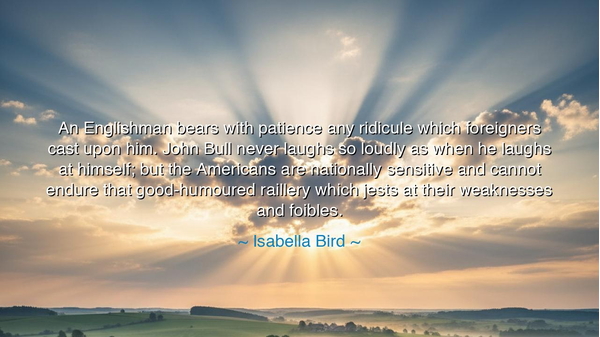
An Englishman bears with patience any ridicule which foreigners
An Englishman bears with patience any ridicule which foreigners cast upon him. John Bull never laughs so loudly as when he laughs at himself; but the Americans are nationally sensitive and cannot endure that good-humoured raillery which jests at their weaknesses and foibles.






Hear the words of Isabella Bird, traveler of distant lands and keen observer of nations, who wrote: “An Englishman bears with patience any ridicule which foreigners cast upon him. John Bull never laughs so loudly as when he laughs at himself; but the Americans are nationally sensitive and cannot endure that good-humoured raillery which jests at their weaknesses and foibles.” Though spoken in the nineteenth century, these words reveal an ancient truth about the character of peoples and the deeper lesson of humility. She contrasts two great nations and the way each responds to jest, reminding us that how a people bears ridicule reveals the strength—or fragility—of their spirit.
When she describes the Englishman, she gives us the image of John Bull, the very symbol of England itself—sturdy, stubborn, and capable of laughing at his own flaws. This patience before mockery is not weakness but confidence, for he who can endure laughter at his own expense shows that his roots are deep and his spirit secure. Such a man does not tremble at words, for his sense of identity rests not on delicate pride but on enduring strength. To laugh at oneself is to disarm one’s enemies, to turn what might wound into harmless jest.
But when Bird turns to the Americans, she describes a people still young, eager, and sensitive to the opinion of the world. Their national character, born of revolution and striving for recognition, could not yet endure laughter with the same ease. Every jest was taken as insult, every light word as an attack. Their greatness, though real, was still bound to a desire for validation, and so they lacked the patience to suffer good-humoured raillery without offense. Here we see the mark of a youthful nation: strength of ambition, yet fragility of pride.
History provides us with many mirrors of this truth. Consider Abraham Lincoln, mocked endlessly for his rough manners, his rustic appearance, and his awkward speech. He could have grown bitter, lashing out at those who ridiculed him. Instead, he often laughed with his critics, telling jokes at his own expense, and in doing so, won their respect. His patience before mockery became one of his greatest strengths, for it revealed humility and disarmed hostility. The same lesson Bird saw in the Englishman was embodied in Lincoln’s leadership.
The origin of Bird’s quote lies in her travels, where she observed nations not as abstractions but as living peoples. To her eyes, cultural differences revealed deeper truths about human nature: some wear pride like armor so heavy it breaks them under ridicule, while others turn ridicule into laughter, making it powerless. Thus, her words are not only about England and America, but about the eternal question of how one responds to ridicule—with anger, or with patience.
The meaning is profound: the ability to laugh at oneself is a sign of maturity. It is the mark of a soul that does not fear imperfection, that knows weakness is part of humanity, and that confidence does not shatter under laughter. The sensitive, who cannot bear a jest, reveal that their pride is brittle, and their greatness insecure. But those who accept jest, who turn it into shared laughter, reveal a greatness that cannot be taken away.
So, beloved listener, the lesson is clear: cultivate patience in the face of ridicule. Do not tremble when others jest at your foibles, but laugh with them, for in laughter there is strength. To grow angry at small jests is to reveal weakness, but to laugh at oneself is to show the world that your dignity rests on foundations no ridicule can shake.
Practical action follows: when you are mocked, resist the urge to take offense. Instead, smile, and if truth lies in the jest, accept it as a mirror for growth. If it is false, let laughter render it harmless. For the wise do not fear ridicule—they transform it into a tool for humility. And remember always Isabella Bird’s insight: that nations and men alike reveal their true strength not by how they boast of their triumphs, but by how they bear their laughter. Patience in ridicule is the armor of the strong.






AAdministratorAdministrator
Welcome, honored guests. Please leave a comment, we will respond soon